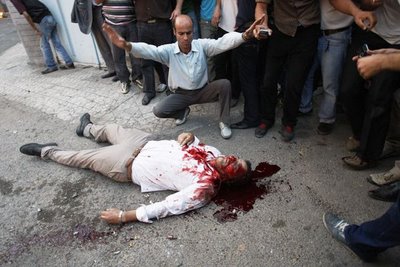A new media martyr.
If the events in Iran are the first time that "citizen journalism" has truly come into its own, helped undoubtedly by the fact that the foreign media have for the most part been successfully banished from the streets, then Neda Agha-Soltan(i), a young protester apparently shot dead by a Basij militiaman has become the first most visible martyr, not just of the uprising, but also of the new media age.
Partly this is because the video of her death is both so horrifying and with it, so cathartic. Unlike many of the other videos which litter the internet which show death and violence, few if any so vividly show a life ebbing away, the soul breaking free of the corporeal body. As her eyes glaze over and as the blood, filling her lungs, is breathed out of her nose and mouth, there are few ends that could so disturb, galvanise and ensure that she will be mourned for years to come. It helps that we don't actually see her murderer, or the moment when she was actually shot; that would diminish the empathy that comes naturally, and instead direct the anger at the individual responsible rather than the state that he or she represents.
Undoubtedly, many will be uncomfortable with the fact that this revolution in filming and writing to the bottom means that we get the sort of material, such as the death of Neda, that broadcasters themselves will not generally show. The BBC have only shown grabs of her on the ground, and before the blood begins to pour from her mouth and nose. Some will argue that such censorship, or rather moderation, is not something to object to: after all, not everyone wants to see such material, even on the news, especially when children also might be watching. Yet it also means that we don't have the full picture, or see the brutality and violence at first hand which such crackdowns bring. Even when such material was more carefully veted however, some of the most iconic images of war remain from the Vietnam era: the execution of Nguyễn Văn Lém, and the naked Phan Thị Kim Phúc running from a napalm attack still have the power, even today, to shock and awe.
Others will object that someone's death could be used in ways in which that person may not have wanted, or even how her family would want. Whether she was actually protesting may be in doubt; latest reports say that she left a car she was in for only a period of minutes, but that those minutes turned deadly does only illustrate just what those protesting are defying in order to demand that their votes count. It can't be denied that dying in such a way means that it becomes public property, by definition. Most would rather want their final moments to be private, but no one also would wish to die in such a way. When we lose the choice in how we pass from this world, we can only hope that our deaths are not prolonged and that we are surrounded by friends, although it remains a truism that everyone dies alone, regardless of method or cause. Neda's was not a lonely death, and the power of it may well yet further help the protests towards a brighter future for Iran as a whole. The idea of martyrdom and sacrifice is highly ingrained in both Shia and Persian culture, and despite our reservations, we can only hope that it further denies moral authority from both Ahmadinejad and Khamenei. Regardless of how the next days and weeks pan out, she is unlikely to be forgotten.
Labels: foreign affairs, Iran, Iranian presidential election, Mahmoud Ahmadinejad, martyrdom, Mir Hossein Mousavi, Neda, Neda Agha-Soltan, new media, revolutions


